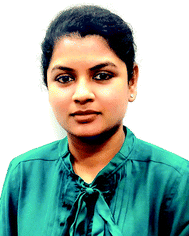Materials Horizons Emerging Investigator Series: Dr Sushmee Badhulika, IIT Hyderabad, India
Dr Sushmee Badhulika received her MS and PhD degrees from the University of California Riverside, USA. Currently, she is an Associate Professor in the Department of Electrical Engineering at the Indian Institute of Technology, Hyderabad (IITH), India. She established the Flexible Electronics and Nano Devices (FEND) Laboratory at IITH and her research interests primarily include flexible nanoelectronics, sensors and supercapacitors. She is the Associate Editor of (IOP) Flexible and Printed Electronics, (Springer) Applied Nanoscience and (Elsevier) Sensors & Actuators Reports. She is also the co-founder of Affocuris Technologies, a healthcare start-up.
Read Sushmee Badhulika's Emerging Investigator Series article ‘An ultra high performance, lead-free Bi 2 WO 6 :P(VDF-TrFE)-based triboelectric nanogenerator for self-powered sensors and smart electronic applications’ ( 10.1039/D1MH01606G ) and read more about her in the interview below:
MH: Your recent Materials Horizons Communication describes the fabrication of an ultra-high performance, non-toxic, flexible triboelectric nanogenerator based on bismuth tungstate as a potential candidate in wearable electronics applications. How has your research evolved from your first article to this most recent article and where do you see your research going in the future?
SB: My first article was on the development of a blood glucose sensor. Over the course of the last decade, I have worked on a wide variety of sensors – physical, chemical and biological sensors. My research helped me to understand the versatility of nanomaterials, their properties and how they can be tailor made to suit diverse applications. However, the need for developing sustainable energy sources for powering these devices/sensors also held my focus. In this work, we demonstrate a high performance, fast response, bio-compatible nanogenerator for powering smart electronics. We aim to continue working in this area exploring new materials and designing novel device architectures to build low cost, portable systems for a wide array of self-powered wearable applications.
MH: What aspect of your work are you most excited about at the moment?
SB: My research is in the interface of engineered nanomaterials, device physics and instrumentation. This multidisciplinary nature of my work certainly lends a learning curve which I find quite exciting. I work with a dedicated team of students from different disciplines like electronics, chemistry, physics and materials science, and there is always something new to learn from each of them.
MH: In your opinion, what are the most important questions to be asked/answered in this field of research?
SB: We have to look beyond the commonly used polymers, metals and transition metal dichalcogenides (TMDs) at new materials that can result in stable devices and deliver substantial and consistent power. In addition, developing efficient power management strategies is crucial for practical applications. Similarly, innovation in manufacturing technologies that include cost effective, scalable fabrication techniques should also be explored to make them commercially viable. Addressing all these aspects will certainly help us leverage the true potential of nanogenerator based self-powered systems in wearable electronics, implantable power sources, point-of-care diagnostics etc.
MH: What do you find most challenging about your research?
SB: Driving interdisciplinary projects can sometimes be challenging since there are a lot of dependencies and core competencies involved. Furthermore, to deliver them in a timely manner adds to the pressure. However, seeing their successful implementation fosters confidence to take up more such interesting projects/ideas.
MH: In which upcoming conferences or events may our readers meet you?
SB: The Materials Research Society (MRS), International Conference on Flexible and Printed Electronics (ICFPE) and the International Conference on Solid State Devices and Materials (SSDM) are some of the conferences I look forward to attending in-person post pandemic.
MH: How do you spend your spare time?
SB: I love listening to music and reading contemporary fiction in my free time.
MH: Can you share one piece of career-related advice or wisdom with other early career scientists?
SB: Sincere effort never goes unnoticed. So, it's important to be patient and stay committed to one's work.
| This journal is © The Royal Society of Chemistry 2022 |

